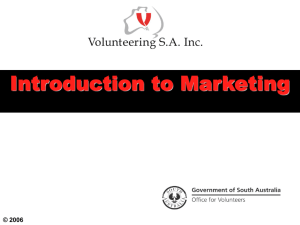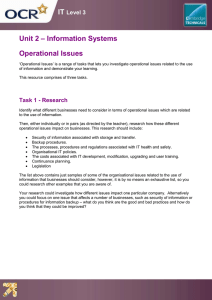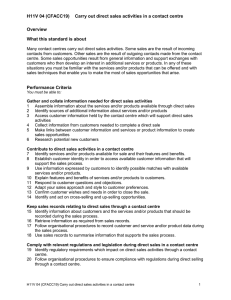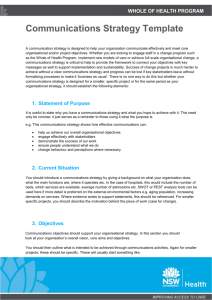Unit 201 Deliver customer service
advertisement
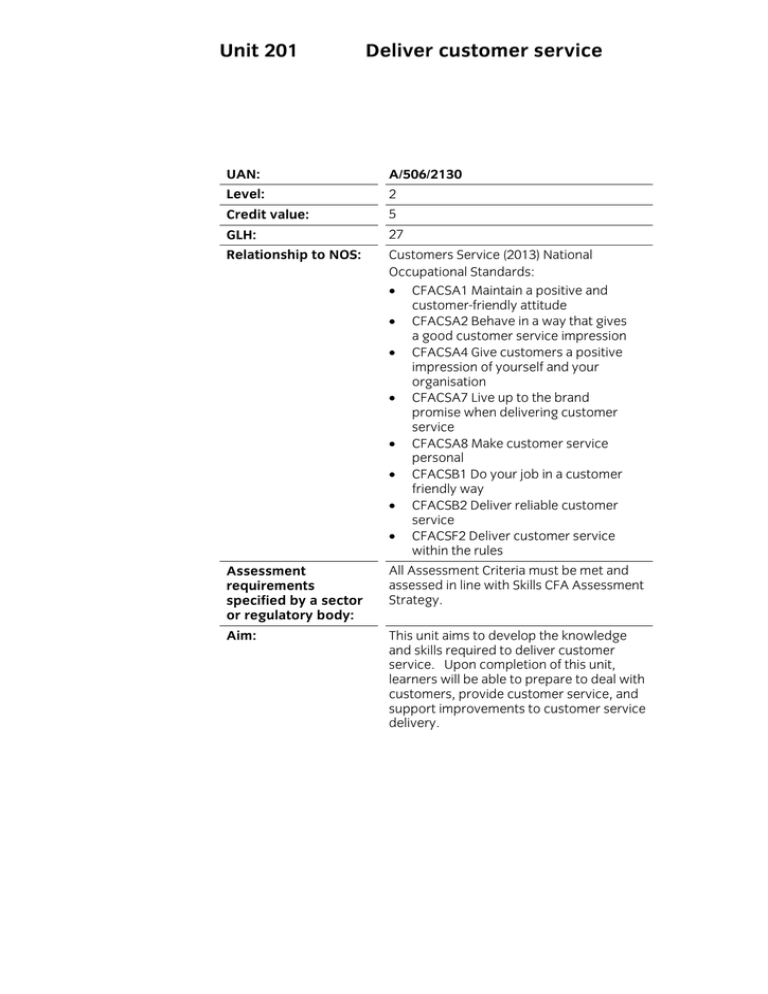
Unit 201 Deliver customer service UAN: A/506/2130 Level: 2 Credit value: 5 GLH: 27 Relationship to NOS: Customers Service (2013) National Occupational Standards: CFACSA1 Maintain a positive and customer-friendly attitude CFACSA2 Behave in a way that gives a good customer service impression CFACSA4 Give customers a positive impression of yourself and your organisation CFACSA7 Live up to the brand promise when delivering customer service CFACSA8 Make customer service personal CFACSB1 Do your job in a customer friendly way CFACSB2 Deliver reliable customer service CFACSF2 Deliver customer service within the rules Assessment requirements specified by a sector or regulatory body: All Assessment Criteria must be met and assessed in line with Skills CFA Assessment Strategy. Aim: This unit aims to develop the knowledge and skills required to deliver customer service. Upon completion of this unit, learners will be able to prepare to deal with customers, provide customer service, and support improvements to customer service delivery. Learning outcome The learner will: 1. understand customer service delivery Assessment criteria The learner can: 1.1 explain the relationship between customers’ needs and expectations and customer satisfaction 1.2 describe the features and benefits of an organisation’s products and/or services 1.3 explain the importance of treating customers as individuals 1.4 explain the importance of balancing promises made to customers with the needs of an organisation 1.5 explain when and to whom to escalate problems 1.6 describe methods of measuring their own effectiveness in the delivery of customer service. Assessment guidance Needs: What the customer must have/requires. Expectations: What the customer thinks they should experience or get. Satisfaction When an organisation meets or surpasses a customer’s expectations. Features and benefits: Feature – what a product or service does. Benefit – how the features meet the customer needs. Balancing promises: Deciding when the promises can be met by the organisation and when it is not viable for the organisation to do what the customer wants either financially or practically. Evidence may be supplied by: professional discussion questioning reflective account marketing materials Learning outcome The learner will: 2. understand the relationship between customer service and a brand Assessment criteria The learner can: 2.1 explain the importance of a brand to an organisation 2.2 explain how a brand affects an organisation’s customer service offer 2.3 explain the importance of using customer service language that supports a brand promise 2.4 identify their own role in ensuring that a brand promise is delivered. Assessment guidance Brand: A brand is the way in which an organisation’s products, services are identified. Service offer: A service offer is what the organisation says it will offer its customers and is therefore what the customer comes to expect. A service offer covers eg the refund policy, its delivery times and the service it will offer. Brand promise: Branding is the way a product or service is recognised and is the promise made by the organisation to its customer. When a customer sees a particular brand they trust it assists them when making buying decisions as they know what to expect. If they do not recognise the brand they will have no clear expectations of the product or service and will almost be taking a risk on any purchase or usage. Evidence may be supplied by: professional discussion questioning reflective account marketing materials brand Learning outcome The learner will: 3. be able to prepare to deal with customers Assessment criteria The learner can: 3.1 keep up to date with an organisation’s products and/or services 3.2 prepare resources that are necessary to deal with customers before starting work. Assessment guidance Resources: eg: marketing materials manuals* documentation* schedules/rotas/daily plan customer records* any monetary requirements. Evidence may be supplied by: observation witness testimony customer records* professional discussion questioning reflective account knowledge base content* service offer* marketing materials manuals* documentation* schedules/rotas/daily plan legislative requirements and organisational ethical policies** Note: this unit is about delivering customer service on a daily basis. Here the candidate will require to be observed over time preparing for and then dealing with a variety of customers. Witness testimonies can be added if necessary. *Internal/organisational documentation need not be held in the candidate’s portfolio but held in the workplace with reference made to where it can be found and its relevance to the criteria. **Note: While the candidate can provide a copy of the organisational policies and of the organisational ethical policy/requirements (or refer to them), this on its own is not sufficient. The candidate will require to demonstrate their application and be able to discuss them, showing understanding of how they are applied. This also applies to legal requirements. Learning outcome The learner will: 4. be able to provide customer service Assessment criteria The learner can: 4.1 maintain organisational standards of presentation and behaviour when providing customer service 4.2 adapt their own behaviour to meet customers’ needs or expectations 4.3 respond to customers’ requests in line with organisational guidelines 4.4 inform customers of the progress of their requests 4.5 confirm that customers’ expectations have been met in line with the service offer 4.6 adhere to organisational policies and procedures, legal and ethical requirements when providing customer service. ] Assessment guidance Presentation and behaviour: personal presentation/dress/uniform presentation of work area attitude tone of voice body language Organisational guidelines: organisational policies/procedures work instructions scripts Organisational policies and procedures which relate to: roles and responsibilities showing limits of authority service offer handling of customer issues Legal requirements eg Sale of Goods Act (Sale and Supply of Goods to Consumers Regulations) Trade Descriptions Act Data Protection Act Equality Act Ethical requirements: organisational principles values fairness Evidence may be supplied by: observation witness testimony customer records* professional discussion questioning reflective account service offer* work instructions/scripts* organisational policies and procedures, legislative requirements and organisational ethical policies** Note: this unit is about delivering customer service on a daily basis. Here the candidate will require to be observed over time preparing for and then dealing with a variety of customers. Witness testimonies can be added if necessary. *Internal/organisational documentation need not be held in the candidate’s portfolio but held in the workplace with reference made to where it can be found and its relevance to the criteria. **Note: While the candidate can provide a copy of the organisational policies and of the organisational ethical policy/requirements (or refer to them), this on its own is not sufficient. The candidate will require to demonstrate their application and be able to discuss them, showing understanding of how they are applied. This also applies to legal requirements. Learning outcome The learner will: 5. be able to support improvements to customer service delivery Assessment criteria The learner can: 5.1 identify ways that customer service could be improved for an organisation and individuals 5.2 share information and ideas with colleagues and/or service partners to support the improvement of service delivery. Assessment guidance Improvements: The candidate does not need to put improvements in place but make suggestions and then share these ideas and related information. Evidence may be supplied by: observation witness testimony customer records* professional discussion questioning reflective account service offer* customer feedback. organisational policies and procedures, legal requirements and ethical policies** Note: This unit is about delivering customer service on a daily basis. Here the candidate will require to be observed over time preparing for and then dealing with a variety of customers. Witness testimonies can be added if necessary. *Internal/organisational documentation need not be held in the candidate’s portfolio but held in the workplace with reference made to where it can be found and its relevance to the criteria. ** Note: While the candidate can provide a copy of the organisational policies and of the organisational ethical policy/requirements (or refer to them), this on its own is not sufficient. The candidate will require to demonstrate their application and be able to discuss them, showing understanding of how they are applied. This also applies to legal requirements.

